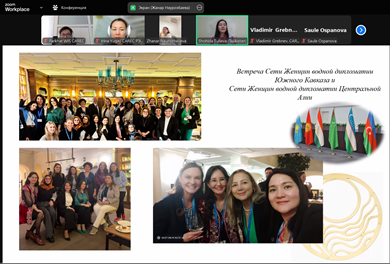Women and water: COP29 key outcomes
Inspiring stories and experiences addressing challenges, such as the sharp decline in the Caspian Sea’s water level and research on transboundary rivers of Kazakhstan and Turkmenistan feeding the sea were shared at an online seminar titled “Climate Change and Gender Aspects” for the network “Women in Water Resources Management in Central Asia and Afghanistan.”
The Regional Environmental Centre for Central Asia (CAREC) organized the seminar as part of the OSCE project “Women, Water, and Conflict Prevention – Phase III” on 10 December 2024.
Members of the Women’s Network discussed key outcomes of the global and regional climate change agendas, with a focus on the main achievements of the 29th Conference of the Parties to the UN Framework Convention on Climate Change (COP-29), held in Baku, Azerbaijan, from November 11 to 22, 2024.
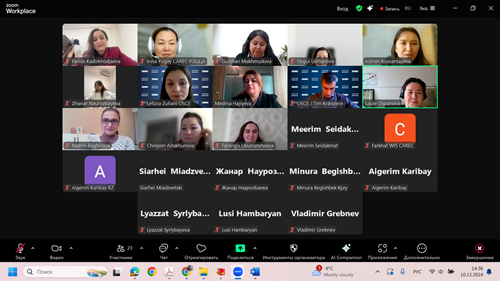
Dr. Saule Ospanova, Head of the Environmental Cooperation Unit at the OSCE, opened the event by highlighting the importance of the participation of representatives from the Central Asian Women’s Network in high-level gatherings of this nature. She emphasized the value of sharing experiences and knowledge with other women’s networks.
Dr. Ospanova also outlined the main achievements of a busy 2024, including key events such as the 2nd Global Forum “Women in Water Diplomacy,” held in Vienna in March, and a September workshop in Almaty dedicated to the strategic development of the Network. She also previewed upcoming events for 2025, including Network meetings as part of the “Drops of the Future” youth seminars in Bishkek and Ashgabat. The “Drops of the Future” seminar series, conducted by the OSCE in collaboration with Switzerland, promotes the Nexus approach in the region and serves as a platform for enhancing the role of youth and women in addressing cross-sectoral challenges.
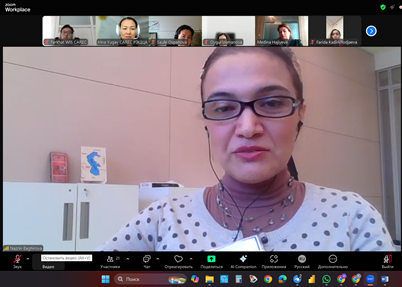
The seminar served as a platform for discussing the outcomes of COP-29 and their significance in advancing adaptation efforts in the Central Asian region, particularly in the context of achieving gender equality in climate action and the region’s role in shaping a sustainable and inclusive global response to climate challenges. Some members of the Global Network had the opportunity to directly participate in discussions on priority climate topics during COP-29 Summit sessions.
A dedicated session focused on exchanging perspectives between members of the Central Asian Network and the analogous Women’s Network of the South Caucasus. Notably, Nazrin Bagirova and Medina Khadzhieva shared inspiring stories and experiences addressing challenges in the Caucasus, such as the sharp decline in the Caspian Sea’s water level and the degradation of water quality. These issues necessitate joint research on transboundary rivers feeding the sea, including collaborations with Kazakhstan and Turkmenistan, for whom the Caspian is a shared water body.
Participants expressed strong support for further collaboration between the two sister networks, emphasizing that women’s leadership and cooperation play a crucial role in ensuring sustainable water resource management and strengthening regional partnerships.
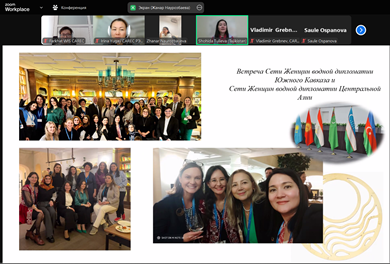
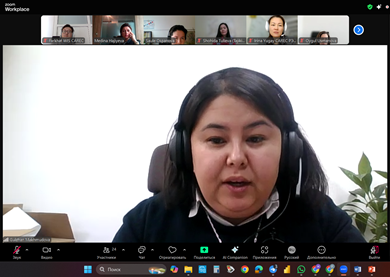
Representatives of the Central Asian Network shared their impressions of COP-29, noting that participation in the conference deepened their understanding of transboundary issues related to climate change and strengthened the region’s presence in international climate negotiations.
Vladimir Grebnev, CAREC Regional Climate Change Expert, presented an overview of the key outcomes, particularly highlighting the “Baku Pact of Climate Unity.” Under this pact, annual funding for climate actions in developing countries is expected to increase to USD 1.3 trillion by 2035. He also emphasized progress achieved beyond official UNFCCC decisions, particularly in cooperation among companies, financial institutions, cities, and NGOs. In the Kyrgyzstan pavilion titled “Kyrgyzstan: Sustainable Mountain Development,” 33 events were held, featuring 276 speakers, including representatives of government bodies and international organizations, 64% of whom were women.
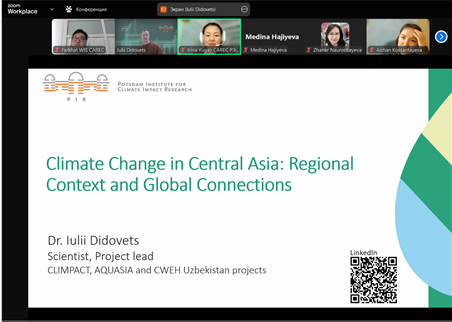
Dr. Iulii Didovetz, Climate Change and Water Expert at the Potsdam Institute for Climate Impact Research (PIK), presented the findings of the IPCC’s 6th Assessment Report and PIK’s scientific studies. He highlighted possible climate development scenarios and strategies for adaptation and mitigation of climate change impacts in Central Asia.
During the concluding session of the seminar, Dr. Guy Bonvin, Deputy Head of Swiss Regional Cooperation in the South Caucasus, emphasized the importance of scientific research in advancing informed cooperation. He pointed out the COP-29 trend of increased funding from international financial institutions for climate initiatives, including gender-focused projects.
The seminar concluded with a discussion on the network’s action plans for 2025.
Additional Information about the Project:
The “Women in Water Resources Management” network was established in 2021 as part of the OSCE-funded program “Women, Water, and Conflict Prevention,” with the support of the Stockholm International Water Institute (SIWI) and the Regional Environmental Center for Central Asia (CAREC).
The network aims to create a community of women experts and practitioners engaged in various aspects of transboundary water cooperation in Central Asia and Afghanistan. It also seeks to enhance women’s capacity in water diplomacy.
Contact person:
Irina Yugay – Acting Project Manager of CAREC Water Initiatives Support Program, wisspecialist@carececo.org

